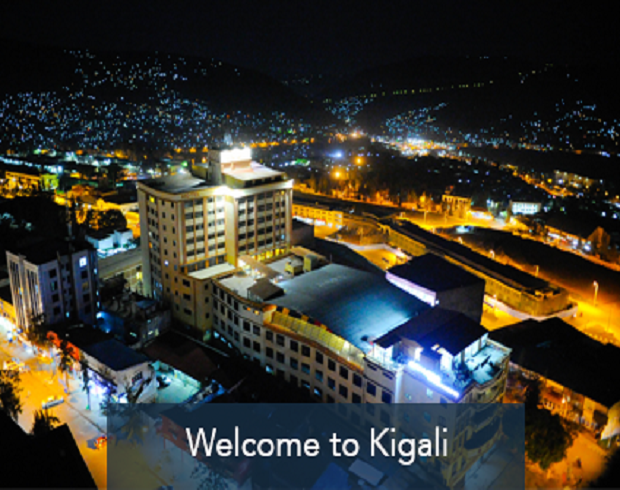[vc_row][vc_column width=”2/3″][vc_column_text]“Cabin crew, disarm doors and cross check,”said the Captain of Kenya Airways’ flight KQ444 that had flown from Nairobi, via Bujumbura and landed at Kigali International Airport last Tuesday. The time was 18:36 precisely. Exactly ten amazingly short minutes later I boarded the hotel’s shuttle to begin my ride to Serena Kigali. It had taken about 8 minutes to deplane, walk into a gleaming airport terminal where six immigration counters were fully manned by young, blue suited officers, get mildly grilled as to the purpose of my visit and walk through with my hand luggage straight out of the terminal. To the right of the immigration counters were two E-Gates, where Rwandese nationals could pass through with just their passports and no human intervention.
We drove out of the airport with the twinkling lights of the beautiful city laid out bare in front of the airport gates and straight into the busy but moving vehicular traffic. Having just arrived from the Ghost of Kidero’s Past,the clean streets were a stark reminder of how Nairobi continues to heave under the collective weight of uncollected garbage and unbanked cash collections. There had already been indications of the Rwandese obsession with health when we departed from Bujumbura about an hour before that. The crew had walked through the cabin of the plane releasing insecticide spray that the Rwandan health authorities required for any incoming air traffic to exterminate potentially harmful insects. Not so in Kenya, we welcome you and your frequent flying vermin.
I was in Kigali to attend a training program where the attendees were citizens of the East African Community member states. Tanzanian, Ugandan and Rwandese attendees brought my unceasing wonderment to a crashing halt as they bombarded the Kenyan attendees with questions about our prevailing political situation, particularly about a bold judiciary, an electoral commission in doldrums and two perennial protagonists that were both sure of victory come October 17th 2017. It was apt that the subject matter of the training – corporate governance- was being tested on a daily, if not hourly basis at the Independent Electoral and Boundaries Commission(IEBC) later in the week. As at the time of writing this piece, 5 out of 6 commissioners had issued a press statement disowning a memo allegedly written by the Chairman Wafula Chebukati censuring the Chief Executive Officer Ezra Chiloba on the handling of the elections.
It is curious that the commissioners did not draw any attention as to the veracity of the leaked memo, which the more sober social media pundits had begun to question. In fact they inadvertently affirmed its authenticity by declaring that they had neither discussed nor sanctioned the memo’s contents, which they only learnt about through the media. What the five commissioners clearly demonstrated was that they were only standing behind their leader long enough to throw him under a bus, which is any chairman’s worst nightmare.
Add to that the fact that there is a communication leak of a confidential memo makes for the script of a Kenyan edition of The Poltergeist. It is unfortunate that a governing body like the IEBC’s commissioners has resorted to lifting up its skirts to reveal the family jewels through the media. There can be no winners with media wars.A chairman’s job is fairly difficult and requires high levels of emotional intelligence, diplomatic speak and consensus building amongst the various internal and external stakeholders that a board has to deal with including its own members.
This could only have happened if some of the Commissioners felt that their Chairman was not building consensus and getting the collective view of the Commission as the governing entity before making critical decisions, especially if he is not an Executive Chairman. I doubt that it was the intention of the drafters of the constitution to give executive powers to the IEBC chair by dint of his being the returning officer for presidential elections as provided for in Article 138 (10) of the Constitution of Kenya.
Our constitutional commissions seem to have created a mongrel of a governance framework that creates a blurred line between oversight of the administrative roles played by secretariats and the execution of the mandate for the constitutional commissions which some commissioners actually undertake. The governance incongruence that this electoral crisis has surfaced at the IEBC, which is quite likely replicated at the nine other constitutional commissions, is one that requires some reflection and urgent clarification by lawmakers of the next parliament.
[email protected]
Twitter: @carolmusyoka
[/vc_column_text][/vc_column][vc_column width=”1/3″][/vc_column][/vc_row]

 carolmusyoka consultancy
carolmusyoka consultancy
 @carolmusyoka
@carolmusyoka


